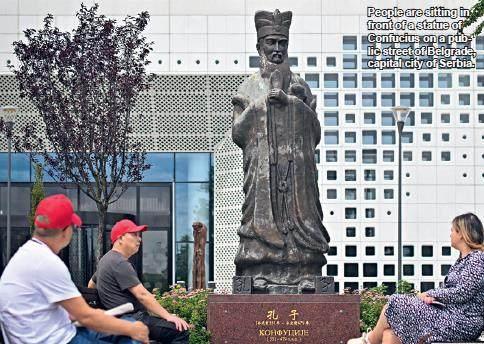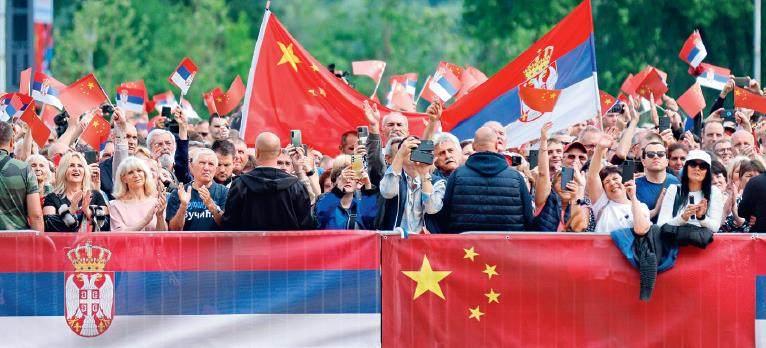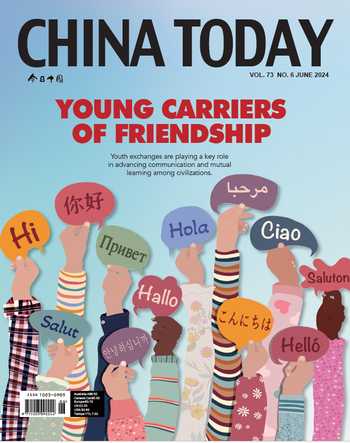Chinese Wisdom in the Three Global Initiatives
WANG YIWEI LIAO HUAN


The thought process behind the Global DevelopmentInitiative, the Global Security Initiative, and the GlobalCivilization Initiative can be traced back to Chinasancient schools of thought.
DURING his visit to Serbia in early May,Chinese President Xi Jinping signed ajoint statement on the building of aChina-Serbia community with a sharedfuture in the new era with Serbian PresidentAleksandar Vucic, which makes Serbia the firstEuropean country to forge ahead in building sucha community with China. This move marks anupgrade of their relations from the comprehensivestrategic partnership established eight years ago. While meeting the press after their talks, thetwo presidents said that both sides had agreed toadvance the Global Development Initiative, theGlobal Security Initiative and the Global CivilizationInitiative, defend international fairness andjustice, and reject hegemonism and power politics.
President Xi delivered the same message ofinternational cooperation in France, which hevisited before traveling to Serbia. When meetingthe press with President Emmanuel Macron, Ximade the remarks, “This year marks the 75th anniversaryof the founding of the People's Republicof China. Thanks to 75 years of extraordinary efforts,transformative changes have taken placein China and in the lives of the Chinese people.But one thing remains unchanged – our peacelovingand kind nature, our open-mindednessand inclusiveness, and our pursuit of fairness andjustice. This is deeply rooted in the 5,000-year-oldChinese culture and in the soul of the Chinesepeople. China stands ready to develop friendlyrelations and cooperation with France and allother countries on the basis of mutual respect,move forward together in the face of commonchallenges, and build a better future together.”
The Global Development Initiative, the GlobalSecurity Initiative, and the Global CivilizationInitiative put forward by China provide guidancefor building a global community of shared future.As noted in the whitepaper A Global Communityof Shared Future: Chinas Proposals and Actionsthat China released in 2023, “It is widely recognizedthat peace and stability, material sufficiency,and cultural-ethical enrichment representthe basic goals of human society. Developmentserves as the material foundation for security andcivilization, security acts as the fundamental prerequisitefor development and civilization, andcivilization provides the cultural-ethical supportfor development and security. The Global DevelopmentInitiative, Global Security Initiative, andGlobal Civilization Initiative proposed by Chinaguide the advance of human society across thesethree dimensions. Resonating and complementingeach other, they have evolved into a crucialcornerstone for building a global community ofshared future, offering Chinas solutions to major challenges pertaining to peace and developmentfor humanity.”
Ancient Wisdom in the Three Initiatives
These three initiatives are based on global consensusand convey Chinese wisdom.
Traditional Chinese culture was shaped by thecoexistence of multiple faiths, primarily Confucianism,Buddhism, and Taoism. Some of theirtenets underpin the three initiatives, such asthe unity of cultivating the moral self, managingthe family, governing the state and safeguardingpeace under Heaven, equality among all, and theabsence of rivalry.
The egalitarianism expounded by Buddhismechoes with the goals of common development anduniversal security of this era. Buddhists make nodistinction between objects of different smells, colors,or sounds. Similarly, Chinas stance on internationalaffairs is that all countries, big or small, areequals, and should treat each other with respect.It firmly opposes hegemonism and power politicsin any form. Buddhism aims for extricating all humanityfrom pain and suffering. This resonates pertinentlyin a time plagued by the widening South-North gap and escalating conflicts worldwide.China respects the sovereignty of other countriesand offers generous help to its developing peers topromote global peace and development. Duringthe Covid-19 pandemic, it supplied free vaccines tomany developing countries. China is also the topcontributor to UN peacekeeping forces among thefive permanent members of the Security Counciland the second largest contributor to UN peacekeepingassessments.
In Confucianism, a person of virtue is obligedto cultivate morality, manage the family well,properly govern the state, and safeguard peaceunder Heaven. Confucians believed that the virtuousare never left to stand alone. They urgedstates to endorse good neighborliness with goodfaith and good will, and pursue both friendshipand interests while putting friendship first. TheAnalects reads, “A superior man seeks harmonybut not uniformity; a mean man seeks uniformitybut not harmony.”
In this spirit, China pursues peaceful coexistence of all members of the international communityand upholds the principles of respectingthe different political and social systems of othercountries, supporting multilateralism and diversity,and opposing interference in others internalaffairs or imposing ones values onto others.
coexistence
TraditionalChinese culturewas shaped bythe coexistenceof multiplefaiths, primarilyConfucianism,Buddhism,and Taoism.
China is also playing an active role in promotingpeaceful development. It emphasizes theimportance of solving international conflictsthrough peaceful means such as cooperation andnegotiation, and works with other countries tosafeguard international and regional peace andsecurity. Guarding against uniformity withoutharmony – which amounts to hegemony – Chinaworks for greater democracy in the internationalsphere in the pursuit of an orderly multipolarworld. For this purpose, it leads efforts to create abetter global governance system that will achieveglobal harmony.
Taoism is known for its aversion to rivalry. Withthe ascendance of China and other emerging economiesover recent decades, there has been a spate ofdetraction, accusing them of disrupting the existinginternational order and posing a threat to othercountries. In fact, China has no intention of seekinghegemony. As Tao Te Ching writes, the reason thatrivers and seas are able to receive the homage andtribute of all the valley streams is due to them lyinglower than the latter. This metaphor conveys theTaoist belief that respect and goodwill toward othersplaces one in a position of strength without rivalry.This is exactly the thinking behind Chinas proposalof building a global community of shared future.China promotes shared values of humanity includingpeace, development, justice, equity, democracy, andfreedom, is open-minded toward other civilizations,and respects the endeavors of other peoples to exploretheir own paths of development.
Cultural Differences
Of the aforesaid three initiatives, the GlobalSecurity Initiative is met with stronger suspicionin Western countries, largely because of the divergencein Eastern and Western cultures and waysof thinking.
In Chinese philosophy, the Dao, or the naturalway of the cosmos, governs all beings and all happenings in the universe. Chinese people are taughtto follow the Dao to pursue harmony and morality.In contrast, Western thinking is defined by dualism,as seen in the antithesis between good andevil, material and spiritual, us and them, and warand peace. Through this lens, international relationsare viewed as battles and the acts of countriesas moves in a zero-sum game in which thegains of one country invariably come at the cost ofthe other. This notion of rivalry hurts the chancesof inter-state cooperation and increases tensionsin the international situation.
Realism, a school of thought in internationalrelations, views the global system as being in astate of anarchy in which major countries vie forpower and security – a scarce resource. Their aggressivebehaviors in this competition will inevitablylead to conflicts and even wars. This postulateprovides some insight into the U.S.s attitudetoward a rising China – often misinterpreting andamplifying Chinas acts as a direct challenge to itsdominance. This presumed antagonism predisposesthe U.S. to a China policy of building globalalliances against it. An alliance meant to opposeother parties is, however, more often than not,fragile because it is devoid of deeper cooperationand mutual trust. Under the myopic strategy ofbuilding alliances against China, Western countries overlook the possibilities of partnering withChina in solving issues of global significance, andmiss out on the opportunities to jointly safeguardinternational stability and development.
The Chinese approach to security has its rootsin the tradition of valuing moral responsibilityand collective wellbeing. It is therefore aimed atfostering international relations based on winwincooperation. China believes that global issuesneed to be solved through joint efforts byall countries as their interests are intertwined.The Western approach to security is by contrastcentered on individualism, confrontation, andcompetition for power and profits. These diametricallyopposed ways of thinking determinethat China and some Western countries adoptdifferent strategies and choose divergent paths ininternational relations and global governance.
Historical and Cultural Roots
On April 15, 2014, Chinese President Xi Jinpingproposed for the first time a holistic approachto national security, which signifies integrationbetween Chinas cultural traditions and contemporaryinternational relations. In seeking waysto address threats to global security, ancient Chineseschools of thought including Confucianism,Taoism, and Mohism, are a source of inspiration.
Confucianism is the philosophical foundationof the holistic approach to national security. Itsnotion that family and nation are inseparable isa central idea of Chinese culture, and has playeda critical role in national unification. Confucianismsees connections between the safety ofindividuals, the stability of their countries, andpeace across the world. It hence emphasizes interdependenceand shared responsibilities. Theconnection between family and nation exists atall levels – material, spiritual, and cultural, makingthem an indivisible entity. This Confucian notiontranscends the tunnel vision of maximizingnational interests and enhancing security solelyby building up national strength. Instead, it advocatescommon security, lasting peace, and developmentfor all.
Another Confucian concept influencing Chinasapproach to national security is Yiduobufen (inseparabilityof one and many), which stresses theall-encompassing nature of the perpetual Daoand views everything from the perspective of theinherent relations between its parts. Examinedthrough this lens, security becomes contingentupon the totality of elements in all relevant areasand the result of the relations and interactionsbetween them. This philosophical thinking revealsthat to respond to security challenges, thebig picture needs to be considered and systematicsolutions sought.
Confucianism also emphasizes the relationshipbetween the whole and its parts, arguing that thediversity of parts does not impede the unity ofthe whole. With this understanding, China callsfor building a global community of shared future.China can have enduring prosperity only if allcountries of the globe live in harmony and realizedevelopment. Meanwhile, China's rejuvenation isnot only in its own interest, but also creates opportunitiesto enhance global security. As PresidentXi said, “Humankind is a community witha shared future. China can only do well when theworld is doing well. When China does well, theworld will get even better.”
The dialectics of Taoism offer inspiration for effectivelyhandling security issues. Taoists perceiveall beings and happenings in the universe through the concepts of Yin and Yang , which are seen asinterchangeable, interrelated, and influencingeach other. They reflect upon the unity of opposites.This view allows China to understand andaddress intricate security threats from a uniqueperspective. Security and development are notindependent of each other, but rather are interdependentand reinforce each other, just like theinseparable relationship between Yin and Yang .Security provides the stability necessary for development,while development lays a strongerfoundation for security. Similarly, crises and opportunitiesare also of a symbiotic relationship,with an opportunity hidden in a crisis and a riskin an opportunity. With proper action, a crisiscan be managed and turned into an opportunity.This holistic approach towards security hashelped China to respond more effectively to challengeson the global stage and to promote steadydevelopment of international relations.
security and development
Security anddevelopmentare not independentofeach other,but rather areinterdependentand reinforceeach other, justlike the inseparablerelationshipbetweenYin and Yang .
Taoists detest wars, regarding arms as instrumentsof evil omen. They preached living inharmony and respecting each other by cultivatingmoral character. Their ideal is rule of virtuerather than rule by force.。
The two core principles of Mohism are universallove and shunning aggression. Mohists called forimpartial care for everyone; caring for others safety,families, and states as ones own. They also stronglyobjected to unjustified wars, saying that attackinga state without good reason is as immoral as killingpeople. They envisioned that when all people reacha level where they can tell justice from injustice,the world would be free of wars. The founder of thisschool of thought, Mozi, not only studied anti-wartheories but also developed technologies to protectcivilians from the destruction of wars. He inventedvarious military defensive equipment, including akind of mobile shield. This dual approach of payingequal attention to morality and practicability is stillrelevant for todays efforts towards establishing enduringsecurity.
WANG YIWEI is vice president of the Academy of Xi JinpingThought on Socialism with Chinese Characteristics for aNew Era and a professor at the Institute of InternationalAffairs at Renmin University of China; LIAO HUAN is adoctoral student of the Institute of International Affairs atRenmin University of China.

